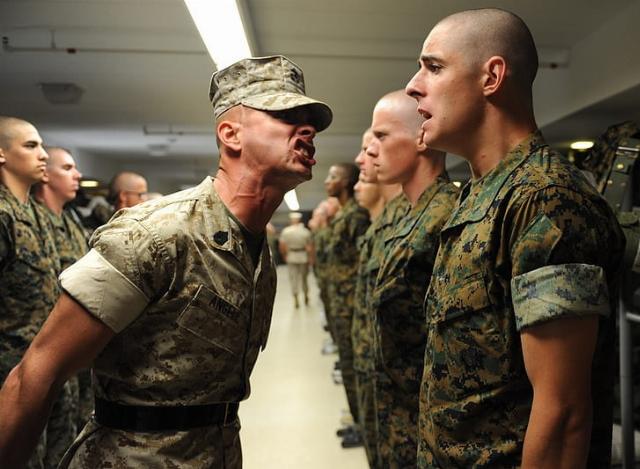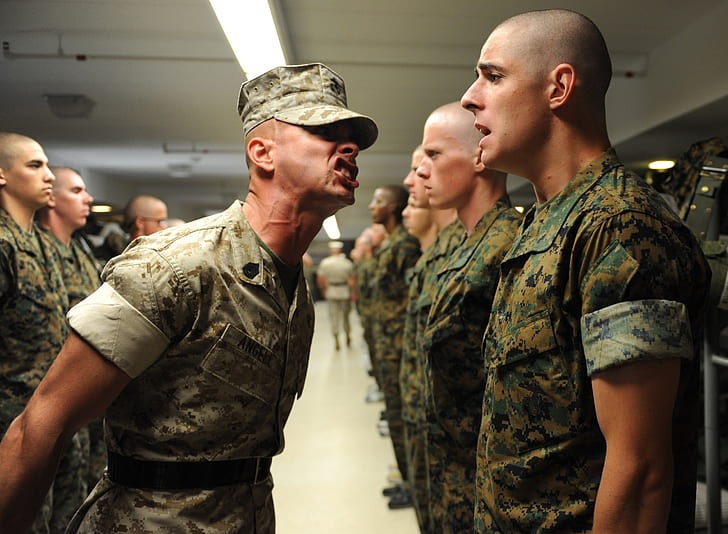

PickPik
Diversity, Equity, and Inclusion (DEI) is divisive, as it emphasizes differences, which is opposed to the time-tested military culture emphasizing unity, teamwork, selflessness, sacrifice, and assimilation into the warrior ethos.Diversity, Equity, and Inclusion (DEI) is divisive, as it emphasizes differences based on race, ethnicity, biological sex, gender identities, etc., which is opposed to the time-tested, traditional military culture emphasizing unity, teamwork, selflessness, sacrifice, and assimilation into the warrior ethos.
May 1969, a commercial bus full of sleepy recruits stopped during darkness at Fort Ord, CA. Two Drill Instructors (DIs) jumped on the bus and started screaming, “get off my bus, you dirtbags, and line up outside.” A diverse assortment of now wide-awake young men lined up in four rows and then shuffled/marched to sterile appearing billets with a platoon of 50 recruits in each open bay, gray double-decker bunks with sheets and a wool blanket on both sides of an aisle running down the middle of the bay. They were awake until 0200 scrubbing the billet floors and latrine; up at 0530 the next day.
The next day they marched with DIs yelling commands, to the long quartermaster warehouse to be issued clothing and gear. But, first a stop at the barber building with a line of barbers ready to buzz hair off which they did quickly leaving about 1/4 inch on the top and almost none elsewhere.
Inside the quartermaster building there was a long countertop with mostly civilians on the opposite side manning issue stations; the recruits moved from one station to the other getting standard Olive Drab issue clothes which they stuffed into duffle bags. Sizes for fatigues, socks, t-shirts, boots, etc. were based on the calibrated eyeball estimate of the QM guy behind the counter. The heavy duffle bags were carried back to the billets where the contents were arranged in foot and wall lockers, dress right dress, according to the SOP, inspected and enforced by the DIs.
All of this was done to erase the “back on the block” civilian mentality and quickly replace it with “you’re in the Army now” and don’t forget it mindset. No more personal identities, no more it’s about me, it is now about the “Green Machine, your ass is mine” and your personal identity as a civilian does not matter; it no longer exists — you are now part of the machine — you have one color — Green.
What was done in basic training was all about “Assimilation” and “Inclusion” into the military; a trainee’s “Diversity” did not matter. What mattered was giving up their past identity and becoming a part of the team — the Green Machine. Everyone was included regardless of race or ethnicity. Assimilation into the team grew with shared hardships, further motivated by group punishment imposed by DIs; when a trainee screwed up, normally everyone paid a price. Everyone dropped for 25, everyone ran extra distance, everyone was up until midnight cleaning the latrine — that is applied “Assimilation.” After a few weeks, real bonding developed to the point when a trainee started to fall out of a run, others would automatically drop back and pull him along to the finish. Camaraderie was developing according to the DI’s plan.
<img alt captext="PickPik” class=”post-image-right” src=”https://conservativenewsbriefing.com/wp-content/uploads/2024/05/which-makes-better-soldiers-dei-or-assimilation.jpg” width=”450″>The DI’s objective was to break down trainees by suppressing their past identities and molding them into soldiers, believing in a common set of values, mission, and purpose. It was about removing the focus on “self” and putting the focus on selfless service with loyalty to each other and the mission; that was done by sharing challenging physical and mental hardships in Infantry Basic Training. The physical training (PT) was tough, as it served two purposes: one was to build the necessary physical strength and stamina to survive in combat, the other was to bond the team by creating mutual trust and confidence in each other’s physical abilities and motivation to succeed. One of the seven PT test events was the 150-yard man-carry where a trainee of equal weight would hoist another and run 150 yards, a timed event. This simulated carrying a fallen comrade under fire to safety and no one wanted to fail the test and let their buddy down. When approaching the end of eight weeks, some trainees had painful stress fractures in their feet due to the man-carry, but they refused to be medically recycled; they were determined to graduate from Infantry Basic Training on time with their platoon.
Today 68% of our military is overweight and/or obese. How many of them could hoist someone of equal weight and run 150 yards carrying a battle buddy to safety? How can one soldier trust another, recognizing this reality? This sad state of physical condition is representative of low standards of performance and readiness coming from DEI.
The bonding in basic training was reinforced by the reality frequently emphasized by the DIs saying “within a year, 90% of you will be fighting in Vietnam.” The point was driven home by the DIs further saying “you had better pay attention to this or you’ll get your ass shot off, or worse yet your buddy’s.”
This model of assimilation had been battle tested for centuries long before America came along and proven to work when civilians from diverse backgrounds are successfully assimilated into a homogeneous fighting force, leaving their “back on the block” identity behind. Conversely, DEI is divisive by focusing on “self” and self-identity as a member of an identity group based on race, ethnicity, gender, etc. This is opposite of the DIs battle-tested model of team building and unit cohesion based on a common mission, selfless service, and sacrifice.
Contrary to the DEI slogan that “Diversity is Our Strength,” the historical truth and battle-tested reality is: “Unity and Assimilation are Our Strengths.”
Maj. General Joe Arbuckle, USA (Ret.) graduated from college in 1968, and entered the Army in 1969 as a private. Following training as a combat engineer, he was later commissioned upon graduating from Engineer Officer Candidate School in 1970. Having volunteered for duty as an Infantry Officer, he served a year in Vietnam on Advisory Team 22, embedded with the South Vietnamese Army. He has commanded at every rank from Lieutenant to Major General, specializing in the missile field.
Image: PickPik





